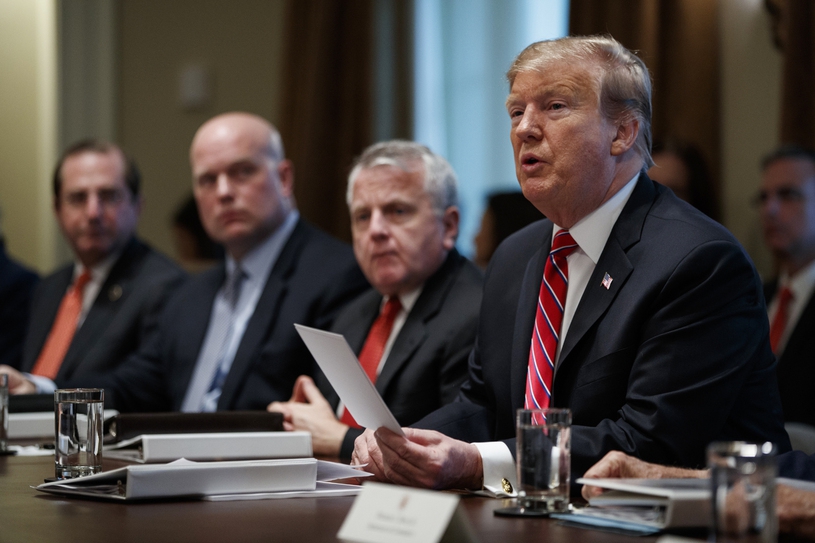Posted on : Feb.14,2019 11:45 KST
Modified on : Mar.25,2019 23:13 KST
 |
|
US President Donald Trump speaks during a cabinet meeting in the Cabinet Room of the White House in Washington, DC, on Feb. 12. (AP)
|
On Feb. 12, US President Donald Trump said that a few phone calls were enough to persuade South Korea to increase its contribution to mutual defense by US$500 million and that Seoul’s share would go up even more in the future. Trump’s first remarks since the cost-sharing agreement was initialed two days ago are very regrettable, since they signal that the US will pressure South Korea to increase its share even further.
This seems to bear out concerns that the US’ motivation in reducing the agreement’s period of validity from five years to one year was ultimately to enable a yearly push for more money. There’s nothing new about Trump’s high-handed and hard-charging approach to foreign policy, but it’s still shocking to see him reduce the value of a longstanding alliance to the terms of economic interest.
The source of the bizarre figures that Trump mentioned on Wednesday is unclear. On Feb. 10, South Korea and the US announced that they’d initialed an agreement that increased South Korea’s contribution by 8.2% (78.7 billion won, or US$69.96 million) to a total of 1.04 trillion won (US$925.4 billion). Trump’s claim about a US$500 million increase isn’t to be found anywhere in the agreement. Seoul denies that the figure is accurate.
Trump also said, “Right now, it costs us US$5 billion a year to defend [South Korea],” adding “They were paying about US$500 million.” That too is false. Last year, South Korea paid 960.2 billion won to support the US troop presence. Converted to US dollars, that’s around US$853 million.
And according to a summary of operational and maintenance costs in the budget for the 2019 fiscal year provided by the office of the US Deputy Secretary of Defense, the total cost of stationing troops on the peninsula, including wages and benefits for service members, is US$3.46 billion. By arbitrarily inflating the cost of deploying US troops and downplaying South Korea’s contribution to that cost, Trump is basically pushing South Korea to pay more.
While it’s possible that Trump got mixed up while trying to brag to his domestic supporters about his accomplishments, it’s even more likely that he was deliberately exaggerating, given his repeated claims that US allies are getting a “free ride” for their defense. Trump’s description of South Korea as a pushover that will fork over US$500 million after “a couple of phone calls” also comes across as insulting an ally.
The Blue House responded by saying that no one should assume that South Korea’s contribution to the cost of defense would go up again next year. While the cost-sharing agreement is valid for one year, the Blue House noted, that agreement could be extended for one year with the consent of both parties. But in light of Trump’s remarks, there’s virtually no chance that the US will consent to extend the agreement, and it’s probably safe to assume that Trump will push Seoul to increase its contribution again during this year’s negotiations. This isn’t the time for the government to be saying there’s nothing to worry about.
Please direct comments or questions to [english@hani.co.kr]
Caption: US President Donald Trump speaks during a cabinet meeting in the Cabinet Room of the White House in Washington, DC, on Feb. 12. (AP/Yonhap News)






